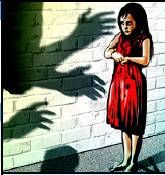BY DURGESH NANDAN JHA IN THE SUNDAY TIMES OF INDIA NEW DELHI SEPTEMBER 19 , 2010
New Delhi: Fear played a major part in the children not reporting the matter to their mother. Whenever the girl refused to have sex with the accused, Lalit Ratawal allegedly used to threaten he would kill her brothers.
The mother is, of course, shattered. She is unable to comprehend what needs to be done to get them out of their traumatic state. Since Friday night, the children were at Prasad Nagar police station, and later on Saturday they were taken to Tis Hazari where their testimony was recorded before a magistrate. Child activists and psychologists said all the media attention can aggravate their trauma. ‘‘Sensitive handling of the victims is required in such cases. Police investigation should not be carried out hurriedly at the cost of care required for the victims. They need to be kept in a quiet environment where there is family support,’’ said Dr Nimesh Desai, Director, Institute of Human Behaviour and Allied Sciences (IBHAS).
He said that while de-addiction is possible in a month, it may take years for the children to come out of the mental trauma. The NGO facilitating treatment and counselling told TOI on Saturday that the brothers — 10 and seven years respectively — have become addicted to the drugs their abuser routinely administered to them. The victims were produced before a member of the child welfare committee late in the evening on Saturday. Raj Mangal Prasad, chairperson of the child welfare committee, said he got to know about the case from the media. ‘‘Action for care, protection, treatment and rehabilitation of the victims will be taken up on Monday,’’ Prasad said.
‘‘They are traumatized and unable to speak much about the actions of the accused. There is an acute sense of helplessness. The girl says she is always feeling sleepy and displays no emotions due to what she put up with silently for such a long time,’’ said Rashi Aditi Ghosh, a counsellor with Shakti Vahini, an NGO.
HOW TO DETECT ABUSE
As per the a government’s commissioned survey released by the ministry of women and child development three years ago, more than 53% of children in India are subjected to sexual abuse, but most don’t report the matter
Who are the perpetrators?
Parents and relatives, people known to the child or in a position of trust and responsibility. It can be the neighbours, teachers, employers, police and strangers
What should parents do?
Children upto 3-4 years should not be left in the care of anyone other than parents
Parents should interact more with their children — about their school, friends and classes
There should not be a communication gap between parents and children
Sex education should be encouraged
Children should be counselled about the ‘right touch’ and ‘wrong touch’
If the child withdraws from daily activities or avoids school or refuses to meet anyone parents should enquire about the reasons Most of the time, abused children avoid going to the place where they undergo the exploitation Children should be encouraged to report matter
THE FALLOUT
Psychological problems Lack of sleep Anxiety and panic attack Physical discomfort like nausea, vomiting and headache Angry outbursts Acute sense of helplessness
Related Articles
- Book Review: From Fear to Love: Parenting Difficult Adopted Children by B. Bryan Post (blogcritics.org)
- Frightening New Type of Child Abuse (fyiliving.com)
- Child abuse – physical – All Information (umm.edu)
- Help them for they depend on us. (socialactions.net)
- Intervention fails to halt child abuse (theage.com.au)
